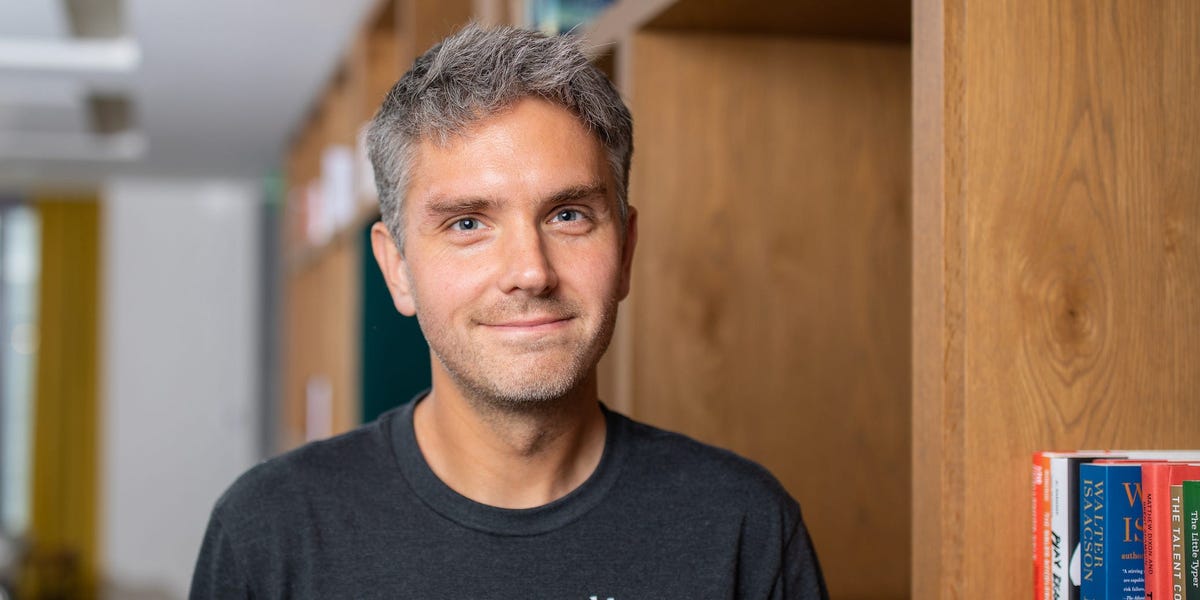- Andrew Bialecki is preparing to take Boston startup Klaviyo public eleven years after founding it.
- Bialecki is a rare breed of founder who bootstrapped the company for years and burned little cash.
- Today he owns 38.1% of Klaviyo, surpassing investors as its largest shareholder.
When Klaviyo hits the public market in the coming weeks, cofounder and chief executive Andrew Bialecki is poised to make a windfall that’s notable even by startup standards.
Bialecki, who cofounded the marketing tech company in 2012, owns more than a third of Klaviyo, according to the company’s recent S-1 filing. His roughly 99 million shares make him Klaviyo’s largest stockholder, outstripping his investors in a rare occurrence.
When a founder starts a company, they own 100%. But to grow the company ahead of generating cash, they often have to sell chunks of the business, or equity, to investors and corporations. According to data gathered by Jason Lemkin, who invests out of his fund SaaStr, it’s typical for a founding chief executive of an enterprise software company to hold around 14% just before going public. They started with the whole pie, but end up holding just a slice.
Bialecki’s 38.1% Klaviyo stake is “as high as I have seen,” said Peter Walker, head of insights at Carta. It ekes out the Atlassian founders, who each owned 37.7% of the company before its market debut, according to Lemkin’s research.
Klaviyo has not yet named a listing price per share so it’s difficult to estimate how much Bialecki’s holdings are worth. Judging by the value of other comparable public companies like HubSpot and Braze, it looks like Klaviyo could be sitting pretty with a valuation north of $9 billion, which would make Bialecki officially a paper billionaire.
A spokesperson for Klaviyo declined to comment.
In the last eleven years, the 37-year-old has quietly built the hottest Boston startup you’ve never heard of. According to three people with direct knowledge of Klaviyo’s origin story, he did so on his terms — bootstrapping the company for the first several years, burning as little cash as possible, and commanding higher valuations without giving away the whole pie. He’s a rare breed of entrepreneur who dodges the spotlight just as well as he evades West Coast venture capitalists, keeping a tradition of Yankee frugality.
Before he raised a cent of capital, Bialecki and cofounder Ed Hallen bootstrapped the company to profitability.
In 2012, the two had hatched an idea for a database company that helped other companies collect information about their customers and query it, cobbling lines of code in empty conference rooms at MIT’s Sloan School of Management, where Hallen was studying for his master’s degree. About a year in, customers started asking Bialecki for a way to pipe their data into an email service like Mailchimp or Sendgrid, which allowed them to send personalized and targeted emails to their customers.
Bialecki and Hallen did them one better: They built an email service on top of the database, so companies could build rich profiles on individual users to better understand the customer’s purchasing behaviors. That insight catalyzed a period of rapid growth for Klaviyo. In 2015, it turned ramen profitable with a few hundred customers and $1 million in annual recurring revenue. The company charges subscriptions based on tiers of use.
Until then Bialecki had no interest in taking outside capital. Born into a family of small business owners, he has a strong independent streak. The chance to build a company on his terms, on his time, appealed to him.
When Bialecki explained to podcaster and Inspired Capital investor Alexa von Tobel why he bootstrapped his company, he said, “I would say for any entrepreneur you should try your hardest to do that because boy I’ll tell you it really changes the dynamics. Like all of a sudden you’re not working against a clock. It gives you more freedom to like think and try things.”
Bialecki is known by three people close to him as a high-motor thinker and a 10x engineer. Born and raised outside of Boston, he graduated from Harvard University where he studied physics, astronomy, and astrophysics, and started his career as an engineer at Applied Predictive Technologies, a Washington, DC, company that did data analytics for Fortune 500 retailers.
“Andy’s very thoughtful and he also can’t be talked into things,” said TJ Mahony, an early super angel in the Boston tech ecosystem, who wrote one of the first checks into Klaviyo. “He’ll listen to you, but in the end, he will make the decision after he’s played it out five steps in his head.”
In 2015, Elias Torres, who had hired Bialecki as an engineer at his previous startup, Performable, spoke to Bialecki about how capital could take Klaviyo from a lifestyle business to a titan of industry, according to two sources. Bootstrapping had afforded the founders complete control, but it also tamped down the company’s growth.
Bialecki’s former boss helped him put together a short list of desirable investors. That’s how Bialecki wound up pitching Jon Karlen, then a partner at the Boston venture capital firm Accomplice, under the ballpark lights at a Red Sox game. Karlen asked to lead the $1.5 million round of seed funding in Klaviyo at a valuation cap of $20 million, which was fully 20 times its revenue, two people said.
Mahony, who participated in the round, recalls thinking the price was very high. “And within two years of that, that would have been considered a bargain,” Mahony said.
Bialecki had delivered a masterclass in startup fundraising. “He only raised whenever he had passed the milestones of raising money. That was the key to his success,” said one person with direct knowledge of the fundraising strategy.
Bialecki treated capital more or less as a rainy day fund, raising as little as possible over the years and spending it scrupulously, according to three people. The S-1 filing shows Klaviyo has raised $454.8 million in funding over the last eleven years, of which it has spent only $15 million. Even so, it’s growing quickly. In its prospectus, the company reported $585.1 million in total revenue for the year ended June 30, 2023, up 57% year-over-year.
“Only a handful of SaaS companies have reached this level of scale and growth with such little burn — it is an exceptional metric,” said Alex Clayton, a general partner at Meritech Capital and an investor in Braze, in a blog post.
Bialecki’s frugality is now being appreciated as funding for startups dwindles and investors push founders to cut costs.
The company’s IPO, which doesn’t yet have a date, will fill Bialecki’s pockets in a meaningful way for the first time. In its prospectus, the company revealed that Bialecki took home a base salary of $78,670 in 2022. For comparison, HubSpot’s Brian Halligan and Toast’s Chris Comparato reported salaries of roughly $240,000 before taking their Boston startups public. Bialecki has also sold few shares of Klaviyo in inside rounds, according to two people familiar with the company’s financials.
Though the company has been known to splurge.
In 2018, Klaviyo staff had worked itself stiff ahead of the busiest time of year for its customers: the holiday shopping season. After it sent a billion emails on their behalf over Black Friday and Cyber Monday, the company chartered a private jet and flew 120 employees to Miami to watch a Patriots game.
Perhaps Bialecki will make a similar exception for a post-IPO celebration.
Are you a Klaviyo insider with insight to share? Contact Boston-based reporter Melia Russell via SMS/encrypted messaging app Signal at +1 603-913-3085 or email at [email protected].
Read the full article here





